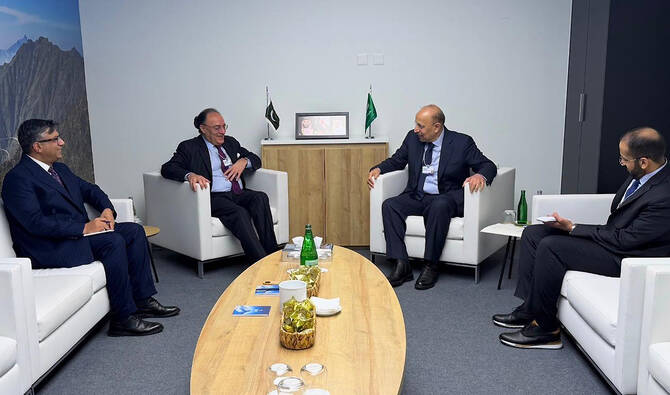ISLAMABAD: One of Pakistan’s most famous journalists, Hamid Mir, will be off air “indefinitely” and not host his popular talk show, two officials at his employer, Geo News, said on Monday, just days after the anchor delivered a fiery speech at a protest rally against Pakistan’s military establishment, accusing it of attacks on journalists.
The suspension of Mir from Pakistan’s top news show, Capital Talk, has sent a chill through the journalistic community just days after journalist Asad Ali Toor, a producer at a local TV channel, was attacked at his home, prompting Mir and others to deliver speeches in solidarity at a Friday protest.
A senior official at the privately owned Geo News, who declined to be named as he was not authorized to speak to the media on the issue, said the channel was under “intense pressure” to fire Mir, implying that the pressure was from the military establishment.
“We are trying to ease this [pressure] by giving him leave for a few days,” the official said. “Hamid Mir is not doing his show today.”
Another senior Geo official, when asked how long Mir would be on leave, said: “For now.”
Pakistan’s military establishment and government have not yet commented on Mir’s suspension or his Friday speech. In the past, they have vehemently denied that they censor the media or harass journalists.
Mir survived an April 2014 assassination attempt by unidentified gunman that Mir and his family blamed on the ISI, an accusation which was broadcast by Geo News, leading to the channel’s broadcasting license being temporarily suspended by regulatory authorities. Even before the suspension, Geo News and its affiliated channels were effectively off the air in most of Pakistan because cable TV operators had pulled them, reportedly under state instructions. The military and the ISI have rejected the allegations they were behind the attempt to kill Mir.
“Nothing new for me,” Mir wrote on Twitter, responding to a post by another journalist voicing solidarity with him over the suspension. “I was banned twice in the past. Lost jobs twice. Survived assassination attempts but cannot stop raising voice for the rights given in the constitution. This time I m ready for any consequences and ready to go at any extent because they are threatening my family.”
Nothing new for me.I was banned twice in the past.Lost jobs twice.Survived assassination attempts but cannot stop raising voice for the rights given in the constitution.This time I m ready for any consequences and ready to go at any extent because they are threatening my family. https://t.co/82y1WdrP5S
— Hamid Mir (@HamidMirPAK) May 31, 2021
President of the Federal Union of Journalists, Shahzada Zulfiqar and Secretary General Nasir Zaidi, said Geo management should inform the journalist fraternity “what prompted them to take this decision within the 72 hours of Mir’s speech in front of the National Press Club on Friday where he condemned non-democratic forces for attacks on media persons.”
“The two [PFUJ] leaders said after the speech it was feared that the government and the establishment would employ pressure tactics on Geo,” a statement by the union said. “We would like to know if it was the result of pressure from the government and the establishment or Geo has taken this decision on its own. In either case it is highly condemnable and would be resisted fiercely.”
PFUJ has appealed to the Supreme Court to take notice of Mir’s suspension and also said journalists would protest in front of Geo offices around the country if the decision was not reversed.
The Committee to Protect Journalists (CPJ) estimates that between 1992 and 2019, at least 61 journalists were killed in Pakistan. Last year, it ranked Pakistan number nine on its annual Global Impunity Index, which spotlights countries where journalists are slain, and their killers go free. Nine of the 65 journalists and media workers killed worldwide while on duty in 2020 were in Pakistan, according to the International Federation of Journalists.
Last month, journalist and a former chairman of the Pakistan Electronic Media Regulatory Authority, Absar Alam, was shot and wounded while he was walking in a park near his residence in Islamabad. Last July, journalist Matiullah Jan was abducted from outside a government school in Islamabad. He was released after 12 hours. Perpetrators have not been arrested in either case.












